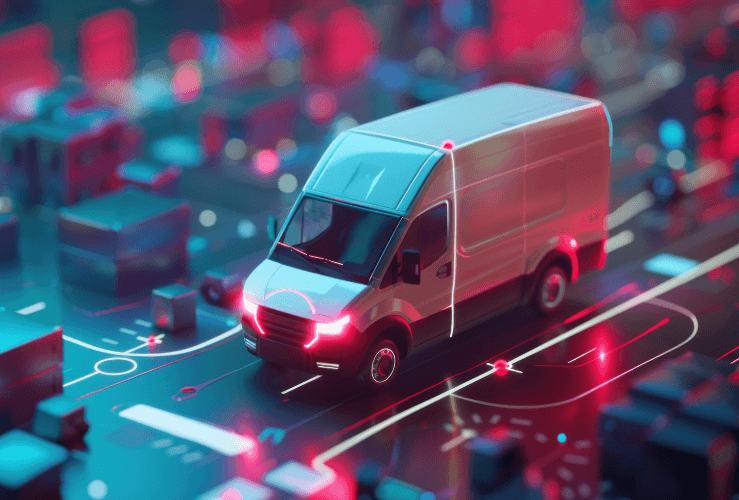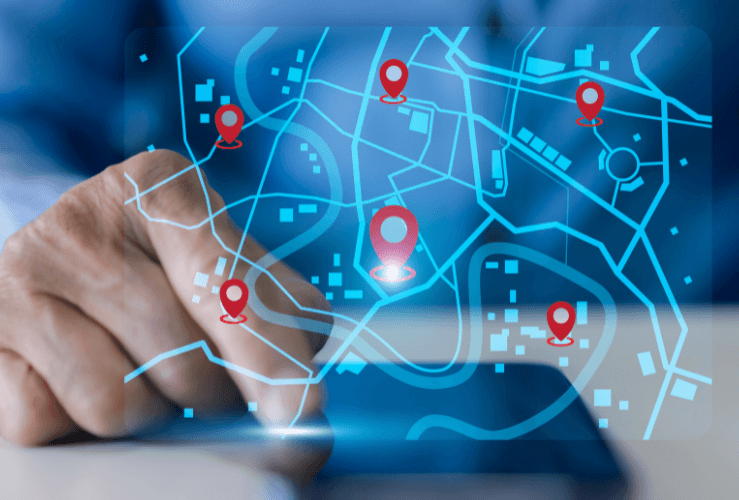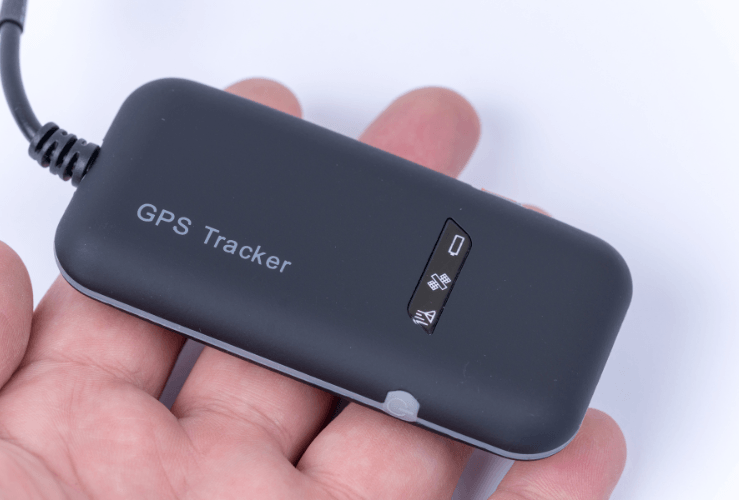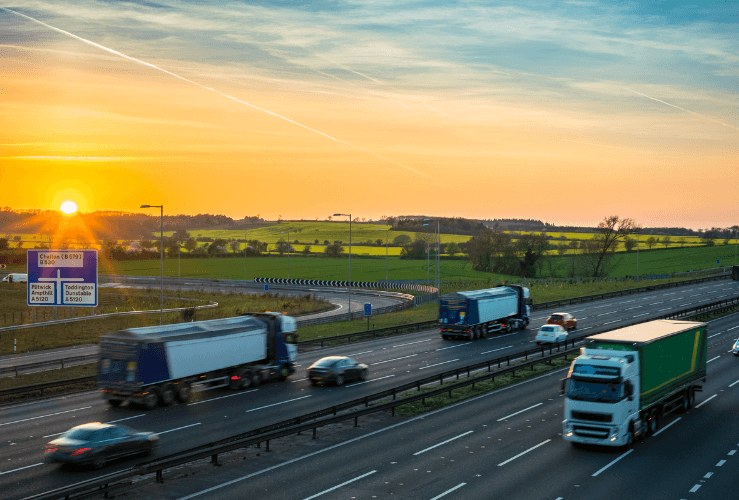Discover the many advantages to harnessing GPS tracking in your organisation, while learning about implementation challenges and costs.
Gone are the days when a fleet manager would wave off their drivers with nothing more than a road atlas and a log book on their passenger seat. From their depot, fleet managers of old would use paper logs and the phone to try and keep track of driver destinations and locations, fuel consumption, maintenance schedules and driver performance and behaviour.

Fleet managers and drivers would often need to communicate in person, which took a lot of time and energy.
Needless to say, this was an incredibly difficult and inefficient way to manage a fleet - especially if that fleet was large.
Pre-internet fleet management was riddled with human error and inefficiencies, while recovering stolen assets was extremely challenging.
Unwanted situations would include:
- Drivers taking inefficient routes
- Drivers being less aware of congestion or closed roads
- Drivers using vehicles in ways that wasted fuel, increased maintenance, or even increased risk to themselves and other road users
- Inability to keep track of vehicles and driver locations
- Inability to keep track of stock/delivery items
- Inability to locate stolen vehicles/assets
- Lost/missed data
- Problems and issues going unreported or not communicated to the relevant persons
- Drivers taking extra-long breaks or taking unnecessary detours
Enter, GPS tracking
The advent of GPS tracking, in unison with the internet and other communication technologies, has meant that all the above issues and more could be monitored and managed with ease, often in real-time.

Key benefits of GPS tracking for commercial vehicles:
Improved fleet management: GPS tracking has enabled fleet managers to keep track of their vehicles and drivers with ease. Route planning has become much easier, reducing travel times and therefore fuel consumption.
Better safety: By being able to monitor driver behaviour, on-the-road safety has improved - reducing risks for both drivers and other road users.
Quicker deliveries: With GPS systems installed, it's much easier to re-route vehicles if there's a traffic jam or other obstacle.
Enhanced asset security: It's much more difficult to steal vehicles or shipments if they are being GPS-tracked. Asset recovery is much more likely, and theft is discouraged.
Reduced costs: GPS means the most efficient route can be selected, cutting fuel consumption. Meanwhile, preemptive maintenance alerts mean vehicles can be taken out for servicing before an issue develops into something more serious.
Regulatory compliance: with so much location and driver data, it's easy to determine when there's a regulation or compliance breach. This monitoring also acts to deter employees from diverging from regulations and company processes.

What features does GPS tracking offer?
Location tracking in real-time: Managers know exactly where their vehicles are and can therefore make quick, effective decisions.
Geofencing: The ability to use virtual boundaries so it's immediately obvious when a vehicle breaches a predefined zone or route.
Optimised routes: Using GPS and accurate maps, the most efficient and fuel-efficient route can be planned, supported by real-time traffic data.
Reports and alerts that can be fully customised: These can be tailored to an organisation's specific operational or data collection needs.
Driver monitoring: Tracking systems make it easy to determine if a driver is speeding, idling, or even accelerating or braking too hard. This improves vehicle longevity and minimises maintenance downtime.
Alerts for maintenance and mechanical problems: With systems that can detect a problem before it becomes serious, major repair works and breakdowns can be avoided.
Jammer protection: Some GPS systems are unaffected by GPS/GSM signal jammers used by some criminals to evade detection after stealing an asset.
Military-grade VHF technology: Some systems employ powerful VHF trackers that work even when concealed inside lock ups, underground car parks and steel containers.
Unauthorised driver alerts: These work by using driver ID tags.

What kinds of GPS tracking systems are available?
GPS tracking systems take various forms. These include:
Hardwired GPS trackers: These systems are connected directly to the vehicle's power system and should run constantly - without any need for batteries. They are installed by trained professionals.
Plug-in or OBD-II trackers: These plug into a vehicle's onboard diagnostic system and collect a range of location and diagnostic data.
Battery-powered tracking systems: These are ideal for vehicles and equipment without a constant power source. While they need a battery, many sophisticated systems can run for years on a single charge.
Solar-powered trackers: Often used for containers and trailers in transit, these use the power of the sun and are one of the more environmentally friendly options since they do not draw from onboard power sources or use batteries.
Personal trackers: These are carried or worn by drivers to help enhance accountability and safety. However, they may raise privacy concerns (see below).
Asset tracking systems: These enable managers to keep track of non-vehicle assets like plant equipment and can help recover them if they go missing. These are highly durable and are set in weather-resistant casings with long-life batteries.
Needless to say, each tracker type is suited to certain scenarios. Choosing one will depend on things like operational conditions, the vehicle or item being tracked, power source needs, required data, installation complexity and cost, and the environment in which the tracker will be used (e.g. a solar-powered tracker may not work with drivers operating in certain locations during winter months).
Which industries employ GPS tracking?
Far from being a 'nice-to-have', GPS systems are essential within many industries for keeping ahead of the competition. As well as making their operations more efficient, GPS can help track down stolen assets quickly - where before they may simply have been considered a write-off.
Logistics: Highly reliant on GPS systems, logistics firms need to know where their vehicles and drivers are at all times, which enables them to communicate in real-time and monitor driver behaviour. It also helps them plan efficient routes and optimise overall operations.
Construction: GPS tracking is invaluable for keeping tabs on assets - making their recovery much easier in the case of theft. It also helps manage the efficient use of equipment, maximising return on investment.
Rental organisations: For firms that rent out vehicles, equipment and plant machinery, GPS tracking helps them know exactly where assets are and therefore prevent theft or assist in recovery post-theft. They also help ensure assets are used safely and properly.
Retail: GPS can be used to keep tabs on deliveries and keep customers updated. It also helps improve delivery routes.
Public services: Ambulances, fire engines and other emergency assets can be tracked with GPS, helping to maintain or improve response times.
Public transport: GPS helps manage buses and other vehicles effectively and to feed into apps that tell passengers when they can expect their transport to arrive - or if it's going to be late.
Farming: GPS can be used to track machinery and livestock - especially across large agricultural areas. It can help farms boost efficiency and productivity.

Bumps in the road: Challenges with GPS implementation
As powerful as GPS tracking is, there are a raft of problems companies face when implementing it into their existing operations. Here are some of the key ones:
Integration: Many companies struggle to effectively integrate new GPS systems into their current operations. Systems must often be customised to exacting needs and need technical expertise to implement - which itself takes time and money. Selecting the right GPS system backed up by the right expertise is essential.
Privacy: Perhaps understandably, some employees do not appreciate the idea of being tracked by their employer during their working hours. These valid privacy concerns must be carefully balanced with commercial goals.
Cost concerns: Paying for GPS hardware, software, related subscriptions and technical help can be costly. Working out the potential return on investment can allay concerns from stakeholders.
Information overload: Companies often experience information overload when it comes to GPS tracking: How to sift through, analyse and interpret the vast amount of collected data? Selecting an experienced data specialist armed with the right tools can help with this.
Cybersecurity: Like any connected technology, GPS systems are vulnerable to attack. This can result in the leakage of sensitive data or unexpected downtime - which can have a direct impact on bottom lines. Having a well-developed cybersecurity plan is key, along with strong passwords and encryption technology, and staying on top of software updates.
Downtime issues: Not all GPS systems are built equal. Some suffer outages and downtimes, which can be a big issue if a firm relies on ongoing real-time data. Selecting a reputable provider is key to avoiding this headache.

How expensive are GPS tracking systems?
The cost of implementing and running a GPS tracking system can vary wildly depending on the system and features selected.
Installation can cost as little as £50, or may be free with higher-cost subscriptions. Subscriptions can cost anywhere from £100 to £600, depending on the system and features chosen. The vehicle or asset type will also play a role in cost; a HGV tracker may well cost more than a car tracker.
Basic hardware and access to entry-level platforms might be relatively cheap - but might only be suitable for smaller companies. It's likely to include real-time tracking and geofencing.
A mid-range package generally includes things like more extensive reporting, customisable alerts and route history data.
Advanced GPS trackers would include all the elements of a full GPS system, including maintenance alerts, driver behaviour monitoring, route optimisation and the ability to integrate with other systems within the business.
You need to factor in installation, activation, upgrade and data plan costs.
You may be able to control costs better - or try out different systems - with pay-as-you-go options, as opposed to costly long-term contracts.
Conclusion
GPS tracking technology has proven extremely useful for companies operating across many industries. It enables managers to monitor location, driver behaviour and vehicle condition, while optimising routes for faster journeys and lower fuel consumption.
Critically, it also helps organisations retrieve their vehicles or equipment should they be stolen.
To operate without GPS technology when competitors are using it, is arguably to run one’s organisation at an automatic disadvantage.
For many companies, working without GPS trackers is simply not an option.



